How to pull out IT from a bog or about communication in stressful situations

Trouble happens ... Suddenly poor feedback, problems with the customer or colleagues, did not raise wages, strange bugs, sudden overtime or project closure - such events trigger a chain of reactive reactions:
- No, there is a mistake -> the bastards themselves -> and maybe things are not so bad -> gut -> okay, let's get out
In this chain, a person behaves reactively, predictably ... and, often, does stupid things. It resembles a state machine, the entrance to which is an unexpected event. The state of the machine is a chain of psychological defenses: denial, anger, bargaining and depression, and the way out is the adoption of new information.
Of these states often have to pull colleagues, customers, and himself.
Under habrakatom, in addition to the description of the stages, there are answers to the questions:
- How to know each state and predict the following?
- How to help get yourself and your interlocutor from the chain?
- What not to do so as not to aggravate the situation?
Examples: how it all begins?
It all starts with the news. Most often - with the bad.
- Sometimes, such news comes to us:
- A colleague comes in and says that he did not have time to finish the piece, which we will show to customers in half an hour.
- The customer writes that there is an urgent need to finish something else on trifles. And these little things are such that for a couple of weeks of work they pull.
- Alarm clock rings
- Sometimes, such news has to tell us:
- Vasya, what you wrote is no good. Rewrite this smelly piece over the weekend.
- John, we don't have time to finish in October. Let's move the release date to next year.
- Honey, I have an important meeting today, so go to the theater without me.
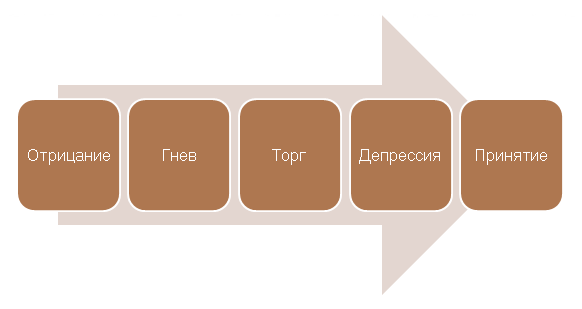
When a person receives such news, he goes through a sequence of denial, anger, bargaining, depression and acceptance. At each stage there are signs and options for action - working and not.
')
Negation
Examples
- The team says it will have time before the release. Although the schedule shows that even a miracle will not save.
- I do not want to read a letter from the customer or pick up the phone
- I really don't want to get up on an alarm clock.
- I do not want to do unpleasant things either. Since for IT people “unpleasant things” is often a synonym for “going to conflict”, the beginning of the conflict is postponed until the last: we don’t tell the wife realistic home release dates, the customer has a plausible release date, and a broken slave about overtime and future dismissal.
- One acquaintance of PM told me that somehow he received feedback from the customer with the minimum possible rating of his work as PM. His first thought was "this is a mistake." And with this thought he lived for several days, although his superiors convinced that there was no mistake, and that this was a problem and that she needed to be addressed.
- When I was told that I needed an operation, I thought that it was a mistake. I thought that there were ways to avoid it, and went to do another X-ray with the belief that he would put everything in its place.
- Steve Jobs found cancer at a very early stage. He did not believe in the disease until it was too late.
- And come on, maybe we somehow get tense and still have time on time?
Description

The horse just does not ride. Now rest, and go further.
One of the first psychological defense mechanisms is denial. Often, the first rush is to ignore the problem. Act as if this does not exist. Act as if the event did not happen.
When a person denies the facts, it does not mean that he does not understand or is not convinced. This means that he is afraid to believe. Reality conflicts with his worldview, and to maintain peace of mind, he tries to convince himself that everything is going as it should, and everything will be fine.
There is a benefit from denial - a person continues to work at the same pace or even faster. A person works by the same rules and by the same plan as before the news. And, sometimes, this strategy works.
- A miracle will happen, the customer will change his mind, someone else will do the unpleasant work, etc.
The negative reaction does not necessarily occur in response to an important Event. This may be a trifle that does not want to admit. For example, at that moment, when we are late for work, but with anger we repeat to ourselves “I’ll be in time, I’ll be in time”, when a person pushed someone else’s laptop, you can hear: “I accidentally touched and he fell,” “I didn’t do anything, I just pressed the power button "...
To maintain mental balance, a person convinces himself and others that an error has occurred, in fact, everything is completely wrong. “This cannot be”, “nonsense”, “this will never happen to us” - often such phrases sound precisely in denial. Usually, at this moment a person does not even want to think about the adverse outcome of events.
To deny it is important to convince oneself, therefore a person sincerely tries to believe that it is.
Denial creates a paradox of thought. To make the denial effective, a person repeats everything that his interlocutors consider to be true, and then tries to convince them that they are mistaken. To find evidence of the facts that he wants to refute, a person has to fully concentrate on what he encourages interlocutors not to believe. You can catch a denier by searching for counterarguments, he searches for them, and when he finds them, even of dubious quality, and grabs them like a drowning man in a straw. As a result, when denying a person, he thinks more about weak points in the proof and argumentation of the interlocutor than on the proof and realism of his.
- In essence, denial is unwillingness to put up with facts.
What is the danger of denial?
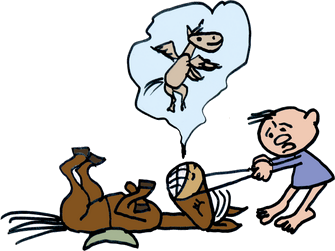
Denial forces one to run away from a problematic topic, as a result, a person does not prepare for an event, does not prepare a “plan B” and, often, is not ready for a situation.
For example: We work with a team for one customer, the customer offered good working conditions, but since it is located abroad, the payment is complicated. After the first month, he created an account, said that he was faced with the problem of transferring money to our country. Then they solved the problem, it took another week, then he said that the money was sent, but we could not receive it. In general, it turned out that we have been working for three months for free.
Each and every reason why we were not paid, is understandable and explainable. In the aggregate - raise doubts about the decency of the customer.
It seems to be a logical way out of the situation - we need to minimize our risks and look for another project where money will be paid. Instead, we continue to pedal the existing one, the topic of money becomes sick for us. And we fall into the trap of denial: we try not to discuss this issue, agree to believe the promises, and continue to work. However, anxiety increases with each passing day. And at some point we will come out of this state, but will not it be too late?
Symptoms of Negation
Their essence lies in the fact that a person is actively looking for ways to deceive themselves and their interlocutors.
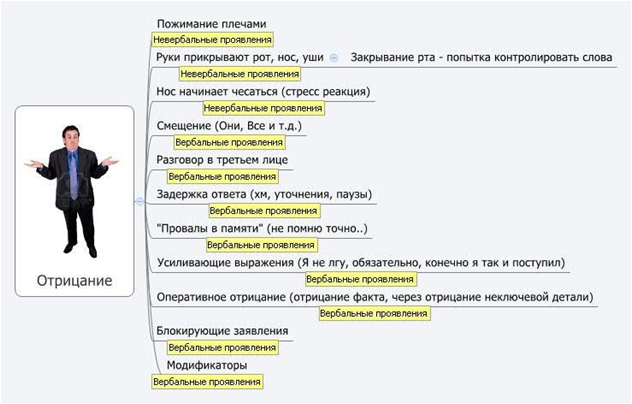
One of the symptoms of denial is memory lapses when the interlocutor cannot remember important events of the recent past. Or rather, he says that he cannot remember.
The phenomenon of lapses in memory is not just forgetting, it is selective forgetting what causes spiritual discomfort and all the related key points and plans.
- Did we talk about this?
- Yes, I need to call John, flew out of my head, and today it's too late, I will call tomorrow ... and tomorrow, too, forgets
- Chronic delays under cover: “I just remembered that we have a meeting” can also testify to this protection.
Key denial expressions
They signal the importance of the next or previous phrase. As a rule, this thought is key in denial.
- honestly
- no doubt
- in fact
- fair
- frankly speaking
There are many similar phrases, and they are individual. Often they are distinguished by a voice.
Modifiers
Modifiers are minor corrections and clarifications that slip into speech and raise doubts. In this case, the proposal itself is consistent with the idea, but a small clarification may change the essence of the matter. Especially if you listen to him ...
- I’m pretty sure they’ll pay us
- It will probably work.
- I rarely make such mistakes.
- Basically, that's all you had to do.
- Yes, I almost finished
Blocking statements
Denial can lead to a counterattack. The essence of this attack is to divert attention from the problem. Instead of problems, competences start to be assessed, the actions and abilities of people are discussed and evaluated:
- Do you think I have not foreseen such a possibility?
- Why should I lie to you like that?
- Could I have done such a stupid thing?
Operational denial
No, he is not deceiving directly, he simply chooses words in such a way that there is no problem, or answers a question with a question.
- - does this feature work well?
- it all depends on what you put in the word "good" - - you fixed a bug?
- everything is fine, everything will work
Nonverbal signs
One curious non-verbal gesture is connected with denial - it is a shrug by shoulders or shoulder. Sometimes, he slips unnoticed when a person is in denial, answers the question or says something.
What to do if you notice the denial of the interlocutor?
In this situation, there are two working approaches
Hard through logic
We suppress the negation using logical arguments and facts. If the facts are not enough - we will get more information.
- - In principle, we have already done the main thing. We will surely meet the deadline.
“I see that there are 50 story points left on the tasks, and there are two weeks to Deline.” And we have an average performance - 10 story points per week. Due to what we have time?
Quite possibly, we know about what happened only from the words of the narrator. In this case, ask questions and fill in the blanks in the description. We place particular emphasis on the facts: what happened then? What did he answer? .. When the interlocutor makes a hasty conclusion, from our side, the conclusion “yes all garbage, everything will be ok”, agree with him. Then ask the question about what will happen if the conclusion is not confirmed: “probably and if not, how do we plan?”, “And what is a backup plan?”, “And what are we doing to reinsure the risks?”
You can use the method of Socratic questions: ask questions about the event and give the person the opportunity to get oneself out of denial. It is better to direct questions against resistance - that which a person most of all protects, and on which he stubbornly insists. In this area, it is more likely to find out important details, conclusions, causes and effects.
- You say you should catch the demo tonight. What else is there left? Test, document and roll out to production? How much time does each operation usually take? Do you think QA will have time to test? Close up? Have you ever felt that when you do something in a hurry while making mistakes? Is there any chance they will be now too? And what will we do if they are?
If the facts are ignored and forgotten, then we patiently recall. It is usually terribly annoying, angry and pissed off and the person enters the next phase - anger.
Main recommendation: be patient. It is necessary for a person to recognize a problem, otherwise it is difficult to work effectively on its non-repetition in the future.
Mild, respect the desire to hush up the fact
This approach is more humanistic. It is based on respect for the interlocutor's wishes to hush up the fact. We agree with him and gently insist on actions that can correct the situation. Consent ensures the maintenance of contact, actions gradually eliminate the need for psychological protection, since they prevent the negative consequences of denial.
- - Tests fell by myself, I did not commit anything
- Well, they need to be corrected. So come on now ...
What to do if you have noticed Denial in yourself?
It's complicated. If it turns out - you are good, and you can prepare for the next phases :) Most often, you can expect an aggressive mood, attempts to mentally crack down on the wrongdoers and prove that they are wrong.
The Most Important About Denial
Denial is an attempt to ignore the problem. If it doesn't work, anger begins.
Anger
Examples
In IT, the word “anger” is somehow not accepted. Instead, they usually use “irritation”, “anger”, “enrages”, etc. Let's see what anger usually results in? We have already decided not to beat our subordinates, the throwing of the mobile phone also remains in the past decade, but other manifestations are more common:
- raising your voice and aggressive posture
- threats
- throw alarm clock far away
- several times I saw how after a small accident the drivers threw themselves at each other with their fists. Sometimes there the cars remained completely intact and the situation was already over, but the drivers got into a fight and risked bringing the case to the criminal article.
Description

Well, get up, stupid animal! Sprawled here, bad beast!
Anger can be a psychological defense. A person slips into accusations, both substantiated and unfounded. The main position - to blame others. But anger is not only an excuse, anger is an attempt to bring the situation under control and to the same course by force.
Anger is more focused on the fight than on the search for a compromise. If in denial a person does not see the problem, then in anger he sees only power solutions. Moreover, preference is usually given to the most extreme measures. Often - with the maximum humiliation of the other side
- -.Who dropped the build?
- this is Vasya ...
- Vasya, what are you doing !?
- Yes, I did not do anything special, just entered a couple of lines, everything was normal there (denial)
- Why then did the build fall? (fact knocking out of denial)
- And how do I know? (denial) Architecture curve, because! (transition from denial to anger) From the very beginning, it was necessary to write normally, and not shout “deadline”, “deadline”!
What is the danger of being angry?
Anger is a physiological phenomenon, accompanied by the release of very different chemicals in the blood. This gives +10 strength, +10 response, +10 tolerance to pain, and -50 to the mind. In the life of an office worker, this is exactly what you need :)
In anger the man
- does not accept new information
- become inflexible and aggressive
- tired quickly, both psychologically and physically. Not an employee, in general.
Symptoms of anger
They are familiar to everyone: Raising voices, clenched jaws, narrowed eyes, aggressive behavior (ignoring personal zones, clenching fists, demonstrating strength, sudden movements, faster and hinting at the attack gait, long and persistent look). However, these are often obvious symptoms. A person who is angry can react calmly and calmly. At the same time he will be given unobtrusive movements and verbal signals of anger.

Attack
A person in a state of anger verbally attacks the interlocutor, insulting, belittling their skills, personal qualities, turning over statements blaming opponents on the principles of “fool himself”, “and he first started,” “and he got what he deserved”, “I have other things or something not".
The argument about the little things
A person in a state of anger can begin to argue on small details or trivial issues, diverting attention from the main issue or solving the main problem.
- Manager: John asks to correct this typo on the main page right now
Programmer: Did you create a task in bugtracker?
M: Maybe you will do it yourself? Or even without her?
P: That is, first you tell that everything must be by the rules, then you hang your work on me. No, let's do everything as usual - Timlid: So, let's use the standards of the HTML language ...
Programmer: HTML is not a language. C # and JS are language, but HTML is not. This is a very important difference, and it surprises me that you do not feel it. - - We, following the example of Toyota, are trying to use Kanban in our development
- That's it, only Kanban is one of the 14 (!) Principles of Toyota! Why don't we use them?
What to do if noticed anger at the other person?
If, during anger, to point out a person’s misses, then anger increases, that is, the psychological defense is strengthened. That is why there are no identical strategies for all defenses. That which removes denial strengthens anger. In order to protect the anger gone, it is important to dispel the anger of the interlocutor. In anger, it is important to keep the person you are talking to; In practice, this is expressed in a variety of techniques working with anger. You can use any of them, or in the complex:
- Depreciation. Difficult to argue with those who do not resist
- - Who told you such a stupid thought about postponement?
- Thought really is not very good
- - Who told you such a stupid thought about postponement?
- I am a post. The word "you" often causes outbursts of anger.
- Instead of “You are to blame for the failure of the sprint, I had nothing to give such a task!” => “I think that in the future I will avoid such tasks”
- Reframing zoom.
- We did not refactor, we just optimized a couple of functions.
- "You" -passed. Sincerely, the truth, without a hint of sarcasm.
- People and their relationships are more important than processes and tools.
- I am always ready to listen to employees that interest you?
- On our project - the most important is the people.
- Synthones. Joy on the bad things
- - How are you boring!
- For QA, tediousness is a positive trait, thanks
- - How are you boring!
- Often during anger, a person tries to regain control of the situation. In this case, it makes sense to give him this control. Or, at least, the illusion of control.
- The choice carries a sense of control, therefore - we give a choice. True or false - depends on the situation:
- Do you think Vasya will cope with this task? Is it easier for you to explain the task to it, or to do it yourself?
- Will it be more convenient for you to rewrite this tonight or Saturday?
- Do you think it will be easier for you to extract data with a simple copy-paste, or write a tool?
- You can break the main question into several smaller and more understandable. Ie instead of the huge “what to do?” We get
- When will the customer say?
- Who will speak?
- Who will attend?
- Let's think about what we want from the situation?
- What can the customer really do? Can he close the project?
- The choice carries a sense of control, therefore - we give a choice. True or false - depends on the situation:
Important!Do not fall into anger, irritation, sarcasm yourself. Aggression feeds aggression.
- Word for word, and got a hedgehog in the face.
Important!In a state of anger, a person perceives facts as a threat. If you force him to accept reality with arguments, you yourself will become the object of aggression. If you prove to him that he is guilty in the event - the anger will intensify. If he decides that this is the fault of another person, then anger will also intensify.
- But sometimes you want to find it in the repository, who wrote this unfortunate line ...
What to do if you noticed anger at home?
Crushed anger is still anger. He will try to get out in trolling, sarcasm or something else. Therefore, if we succeeded in intercepting anger in time, then you can use something from the arsenal:
- Take a pause
- Let's take a little break now? I want coffee badly
- Change place. Emotions are strongly attached to the situation, and, changing the situation, you can change the emotion
- Let's go to the meeting room and continue there.
- If there is a possibility - a few deep breaths or moves with arms and legs will help a lot.
Yes, after anger, feelings of guilt and depression often come. This is normal and almost inevitable.
The most important thing about anger
Anger is hormones and other chemicals in the blood. How difficult it is to sober up the effort of will, and it is difficult to escape from anger.
- When a person is angry, his logic does not work
- The phrase "calm down" - leads to an explosion
When anger dissipates, a reactive Torg reaction often occurs.
Bargain
Examples
- And come on, maybe you can think of something over the weekend, and then I will try to knock out a bonus?
- And what if this bug is not noticed on the demo, and then we fix it?
- Let's add a crutch now and fix it after the deadline.
- This is part of my fault ...
Description
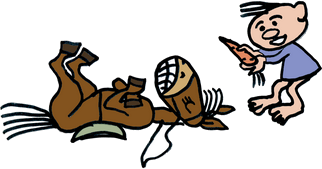
Well, honey, well, get up, please ...
Another psychological defense is called bargaining or negotiation. Bargaining is very different from anger and denial. When a person goes into bargaining, he, in fact, recognizes that the situation has taken place, but at the same time the person is looking for ways (non-constructive ways) in order not to encounter the result of the situation. Bargaining should be distinguished from an attempt to agree, in bargaining everything is exaggerated and slightly distorted. In bargaining, many things are brought to the extreme. Often bargaining looks like an attempt to pay off problems. In fact, bargaining is an attempt to disguise reality without denying it. This is a mild form of deception and self-deception. Bargaining may look like an attempt to reach an agreement with higher powers (and unilaterally), may manifest itself as an attempt to reach an agreement with a partner unilaterally (Let me do this, and you accordingly will do what you promised).
You can mark the stage of negotiations as an attempt to regain your self-esteem.
What is the danger of bargaining?
They say that hope dies last, I would kill her first
M.Ye. Litvak
The worst thing in bargaining is hope, hope at random, that everything will be settled by itself. Because of this hope, a person makes the wrong decisions, waits when he has to act, tries to shield himself at the moment when he has to solve problems.
Important!Stage bargaining is often used by fraudsters. At this stage, the desire to pay off the problem makes the person very vulnerable. In IT, this also happens:
- In the heat of an argument, a programmer raises his voice to a colleague / lead / scrum master / PMa or customer, does some kind of personal lunge or something else, which then becomes a little embarrassing. So, while it is shameful, tasks are hung on him that I don’t want to do. Or just push their decision on architecture.
Symptoms of Trading

Soft synonyms
Hard words with negative connotation are replaced with soft, positive, justifying. Inattention becomes fatigue, lack of communication - lack of time, etc.
- I didn't scream, I just raised my voice
- I did not exceed the speed, I just moved in the stream
- I didn't mess around, I waited for inspiration
Quantity changes
A person rounds the distance, quantity, time in the best advantage for themselves.
- There are only a couple of bugs left.
- Because of one line so many disputes
- After two minutes will be ready
- I stayed a few minutes
Explanation of actions
At some point, a person explains his actions with minor troubles, illnesses, excusable weaknesses ... he tries to appear as much as possible in a more favorable light to the interlocutor.
- What is the quality of commits after lunch on Friday?
It is curious that it is really important for a person to be heard and agreed with him. If this is not done, then anger is likely on others or on oneself, an attempt to take control of the situation by force.
Belonging to a special group
I am an old soldier and I do not know the words of love
(s) Hello, I am your aunt
Sometimes people try to justify their act by belonging to a popular group of people. It does not sound very clever, but people in reactive reactions are not at all inclined to act rationally.
- I have been working on this project for five years.
- I have 10 years in IT
- I stood at the origins of this company
- I have a scrum master certificate
Excessive politeness and courtesy
- Miserable expression on face
- Many apologies. Very often, in combination with the reception - "I am not such a person"
- Makes small gifts and services (gives place, buys beer, etc.)
What to do if you noticed bargaining with the interlocutor?
In a state of bargaining there are few effective impacts: agree with his version of events and support his self-esteem. As a technician, compliments and active listening help. Support and direct to action, you can use the Socratic dialogue.
Important!in this state a person is very vulnerable to criticism. Therefore, criticism can return the state of anger.
Important!In a state of bargaining a person can promise a lot of things, you should not believe that he will do it. But you can use this state to conclude a mutually beneficial contract. True, be prepared that a person in the future will try to break it.
To illustrate, remember how many times we, under the influence of such moods, promised to start a “new life”, “to do everything that depends on us”. How many such promises are kept?
What to do if you notice bargaining at home?
- Keep promises, and from the desire to justify themselves
- Prepare that the mood is suddenly spoiled
- Find ways to increase your self-esteem, remember successful business, professional or personal growth, re-read positive reviews, etc.
The most important thing about trading
Bargaining is the first step in accepting new information; a person ceases to defend against it and is ready to include it in his model of the world. At this point, a person may be psychologically vulnerable, and he needs social support. Some people, feeling their vulnerability, are trying to live this stage away from people. Unfortunately, this only stretches the bargaining stage.
Depression
Examples
- Everything is lost...
- Of course, I shouldn't have given such a task to a newcomer like you ...
- And why have I contacted these Russian outsourcers? Saved, called ...
Description

I'm in trouble ... This could only happen to me ...
Disclaimer: We are talking about depression here, as a psychological defense. Depression, as a mental disorder, can grow out of such protection, but this is beyond the scope of the article. On cases where a person is depressed all the time, we also will not speak now.
Depression is a way of isolation from reality. A person needs time to reconcile with the facts and recuperate during the Wrath.
Depression happens in everyone, and our task as a manager is to help get out of this state. Of course, if our qualification allows it. There are several reasons why this is worth doing:
- a depressed worker is not a worker
- if we can help an employee feel better, it makes sense to do it,
- having a depressed team member undermines the motivation of the whole team.
In essence, depression, as a defense, is an attempt to recuperate and rethink the assessment and understanding of oneself. Not necessarily in this defense a person falls for a long time, sometimes it happens literally within minutes. "Something sad", "somehow it became sad" - usually characterize these states. Often depression is a consequence of the expenditure of energy, for example, after a chain of resistance denial-anger-bargaining. Usually a person goes into depression just to recuperate.
Precisely because depression can be the result of mental fatigue, and it makes sense to rest ...
Two types of depression
There are two types of depression: preparatory and reactive. To distinguish them is simple. Preparatory is a depression associated with negative events in the future that are very likely to happen. The human brain tends to round off the percentages of probability before the answers “happen” - “not happen”, and the rounding rules are very individual.
- In the evening, to show the result, but obviously that we will not have time to get close ...
- The “wrong” letter went to the customer, and when they wake up, there will be big disassemblies
Reactive depression is a depression associated with negative events in the past, what has already happened, what has not changed, and how you should live with it.
- I flunked the project.
- On Code Review, my code was smashed
- In retrospect, everyone accused me of slowly working
What is the danger of depression?
Pessimism, low activity, people fixated on their problems.
Symptoms of Depression
Preparatory depression makes a person silent and reticent. Usually, people in this state do not want to communicate with others and seek solitude. You can see the "cocoon" - a person embraces himself with his hands and as if he is fenced off from everything.
A person in reactive depression is verbose, wants to share his anxieties, voices his pain, often requires active participation in his problems of friends, specialists of various kinds, employees.
Depression creates a certain facial expression: you can notice the eyebrows of the house (sad eyebrows), a look down, head lowered and often pressed to the chest (collarbone), lowered corners of the mouth.

What to do if you notice depression in the interlocutor?
Bad event in the past - reactive depression
With reactive depressions, it makes sense to look for the positive aspects of what happened, to point out the bright sides of work, life, relationships, help compliments, and simple psychological support in the format: we are with you, we are one team, etc.
In other words, a positive interpretation of events helps if the traumatic event has already occurred and its consequences are felt now.
Bad event in the future - preparatory depression
With preparatory depression, when trouble is in the future, encouragement can cause anger and irritation. It is important to be a good listener, patient and sympathetic. Here help active and passive listening.
What to do if you notice depression in yourself?
It will pass.This is interest on the loan for energy. The very energy that was poured on themselves and others in the phase of Anger. What to do:
- Relax, escape and switch
- Use time for simple monotonous work that does not require creative abilities
The Most Important About Depression
Acknowledging problems and supporting compliments is the best strategy.
Adoption
Examples
- Okay it's time to work
- Let's think about possible solutions and consequences.
Description
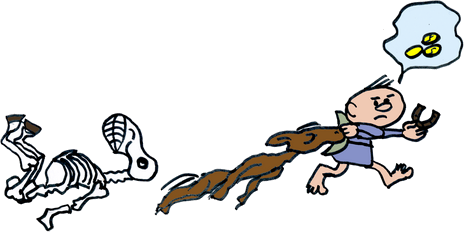
Died and died. What can you get from this?
Acceptance is not a psychological defense, it is one of the constructive ways out of defenses. Without a description of this state, probably, the list of reactive states would not be complete, since it is often the acceptance that is the final link in the chain of denial - anger - bargaining - depression.
Acceptance is a reactive mechanism when a person takes responsibility for all his actions. Usually, in this state, a person adequately evaluates his capabilities and obstacles to achieving the goal. Acceptance demonstrates the end of the jet chain and the exit from it, usually in this state, the person is most adequate in relation to his own strength and capabilities. Usually, after the passage of this state, a person's efficiency increases, and this is true both for monotonous work and for creative work.
Symptoms of Adoption
There are three main types of verbal messages that indicate that a person moves to the acceptance stage. These are talk about the consequences, talking about yourself in the third person, and paying the debt.
Talk about the consequences
Talking about the consequences - these are questions and assumptions, what the consequences of an event might be, an attempt to rationally weigh them and take everything into account. Adoption is the only phase of the chain of reactive reactions, when a person freely, rationally and without masochism discusses the consequences of an event.
About myself - in the third person
Sometimes it is difficult for a person to talk about himself in such a situation. And speaking of himself, he speaks as a stranger.
- It was a mistake, another time it will be necessary to take into account all the information.
- The manager must think through such things in advance.
- Will you feel better if I admit that this is my fault?
Payment of debt
The desire to do as much as possible to compensate for the failure. If a person finds an opportunity to reduce the negative impact of what was in the past or to make a compensating act, then he becomes strongly motivated for such an achievement. You can be sure that he will do everything possible to achieve the task.
Non-verbal signals
Non-verbal acceptance signals coincide with depression, look and shoulders down. Therefore, these two states are easily confused.

What to do if you notice Adoption with the interlocutor?
At the stage of adoption it is best to support the person, listen, assign a task.
What to do if you notice Adoption?
Great, you can work.
The Most Important About Adoption
- In making a person is logical again
findings
- Everyone enters the sequence Negation-Anger-Torg-Depression-Acceptance. Often - several times a day.
- For each state, it is better to use the appropriate style of communication. That which is good for Denial, for Anger, is explosive.
- Up to the stage of Adoption, man is not logical. It makes sense to go through the stages quickly.
- After anger, depression is inevitable. The longer the anger, the longer the person departs.
Mindfulness helps determine the current phase. Knowing the current stage, you can consciously expect the next one and move to a working state faster.
Disclaimer: in the article - many psychological techniques (active listening, etc.) are mentioned without decoding. Please write in the comments if they are worth adding.
Bonus
Update: History and links
Note: The article was written in collaboration with the practicing psychologist dsnisar .
Note: Next comes a block that has no immediate practical significance.
The idea of this model originated a year ago. During this year we tested it on our own experience as well as on the experience of the participants in our trainings.
What prompted us to write an article, and how we collected information.
1. Kubler-Ross or the stage of dying
The stages are taken, as already written in the comments, from the works of Kubler-Ross
Kubler-Ross, E. (1969). On death and dying. New York: Macmillan.
Kubler-Ross, E. (1975). Death: The final stage of growth. Englewood Cliffs, NJ: Prentice Hall.
The idea of extrapolating stages to everyday life appeared quite a long time ago. In the process of discussing the model, Elizabeth Kubler-Ross herself expanded the scope of her theory, initially applied only to incurable patients, to any strong personal losses.
2. Stress, as the starting trigger of reactive reactions
It is difficult to say exactly who first proposed to consider stress a trigger that triggers the stages of the Elizabeth model. The authors of the article initially peeped at the idea of linking stress and dying stages with Wall Volters . Wall used a rather original stage of dying to determine the sincerity of the suspects. He, in turn, extrapolated the Kubler-Ross model to track lies using the idea of P. Ekmen(Telling Lies: Clues to Deceit in the Marketplace, Politics, and Marriage) that lying causes stress. According to Volters, stress should trigger a chain of reactive reactions (Volters' term), i.e. Kubler-Ross model. Of course, this formulation is not ideal from the point of view of theoretical psychology, but, based on the feedback on the work of Wall Walters, it has shown itself quite well in practice.
3.
The coincidence of the stages with the general adaptation syndrome G. Salier speaks in favor of the Kübler-Ross model .
OAS, according to G. Salye, goes through three stages:
alarm reaction - resembles a state of denial (in the Shock phase), and a state of anger (Antishock phase);
resistance - at the beginning of the phase, the continuation of the state of anger, after passing the peak, resembles the state of bargaining, if you extrapolate it to human behavior - the body feels exhausted through emotional states (fear, anxiety, etc.) and the mechanism of self-esteem (self-esteem falls) the psyche is encouraged to seek protection, and support from other people.
exhaustion and recovery - the third stage , in fact, demonstrates a phase of depression and, in part, acceptance (only as part of a recuperation).
By itself, the general adaptation syndrome does not relate to the process of accepting and processing new information, and changes to the self-concept that occur in the Kübler-Ross model, its task is to help the body cope with the situation at a biological level. But, at the same time, by launching biochemical reactions in a specific sequence, it strongly influences the stages described by Elizabeth. If a person copes with stress, he has the opportunity to get out of the sequence. If a person constantly feels stressful, then he gets the ever-changing stages 1-3 of the Elizabeth model, which then ends with the stage of depression. Depression is usually quite strong, since the adaptive capacity of the body is completely exhausted. Often this is accompanied by psychosomatic diseases.
4. Transactional Analysis and the Five-Step Kubler-Ross Model
To a large extent pushed to monitor the reactive states of Transactional Analysis , which contains a similar system, also tied to stress. Stan Wollams put forward the idea of a scale of stress. The more stress, the greater the likelihood of a person entering the script. Entering the scenario process, according to Franklin Ernest, a person changes his life position (I + You +, I + You-, I-You +, I-You-) according to the OK Corral model. This model fits very well on the model of reactive reactions. For brevity, you can combine two models in the form of a picture:

During denial, a person holds the position of I + You +, the negation itself acts as a psychological defense of the existential position. If the level of stress is high enough, and the negation does not work, then the person goes into the scenario process, changing existential positions depending on the scenario. Additionally, you can read in Ian Stewart, Vann Joins "Modern Transactional Analysis"
Source: https://habr.com/ru/post/152955/
All Articles